新概念一册l119-121课重难点和练习汇编
新概念一册l119-121课重难点和练习

Lesson119– Lesson 121 姓名:家长签字:●重点句型:1. I want to tell you a true story .Tell sb a story 给某人讲故事2. It happened to a friend of mine a year ago.(1)happen 发生Eg: What happened ? 怎么了?Sth happen to sb. , (某事) 发生在某人的身上.Eg:Good things always happen to me .总有好事发生在我的身上Sb happen to do sth 某人碰巧做某事(2)a friend of mine,我的朋友之一。
3.After they had entered the house, they went into the dining room.entered 是enter 的过去分词,“进入”had entered 是过去完成时,表示在某个过去时间之前发生的动作4. It was very dark, so they turned on a torch.turn on, 打开,拧开(电视、水源、煤气等)。
其反义词为turn off(关上)。
5. Suddenly, they heard a voice behind them. "What's up? What's up?" someone called. Thethieves dropped the torch and ran away as quickly as they could.1)suddenly 忽然、突然地2)voice 嗓音,有声带震动发出的声音;noise 尤指噪音;sound 用来指一切声响3)what’s up ?干什么?有什么事?4)run away 跑开,逃跑6. I bought two expensive dictionaries here half an hour ago, but I forgot to take them with me.1)half an hour ago 半小时以前(用于一般过去式)2)forget to do 表示忘记去做某事forget doing 忘记做过….3) take sth with sb 把某物带走bring sth with sb 把某物带来take sth to sb =take sb sth 把某物拿去给某人●重点语法:一. 过去完成时构成: had +过去分词。
新概念英语第一册Lesson119-120笔记(语法点+配套练习+答案)

12. The studentswere reading(read) English when the teacher came in.
13. Look! The monkeyis climbing(climb) the tree.
I’d like you to meet a friend ofmine(I).
enter
1.v.t.进入
=go into
2.v.t.参加
enter the army参军
3.enter for报名参加
n.entrance入口
She entered the room quiety.
她悄悄地进入屋中。
Heenteredthe universityatthe age of 21.
--- I lost my wallet.
---Whendidithappen(happen)?
--- Yesterday afternoon.
Good things always happentome.
I don’t believe that.
我不相信这事发生在他身上。
My motherhappenedtofind my keytothe front door in the garden.
他21岁上了大学。
Alotofstudentsenteredforthis competition(比赛).
很多学生报名参加这个竞赛。
dark
1.adj.黑的,暗的
2.adj.深色的
3.n.天黑
before the dark天黑以前
2020最新新概念英语第1册课文详注Lesson119~126
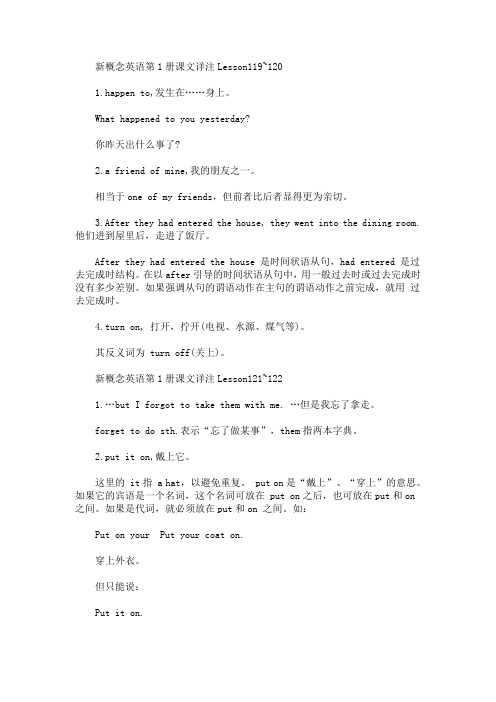
新概念英语第1册课文详注Lesson119~1201.happen to,发生在……身上。
What happened to you yesterday?你昨天出什么事了?2.a friend of mine,我的朋友之一。
相当于one of my friends,但前者比后者显得更为亲切。
3.After they had entered the house, they went into the dining room. 他们进到屋里后,走进了饭厅。
After they had entered the house 是时间状语从句,had entered 是过去完成时结构。
在以after引导的时间状语从句中,用一般过去时或过去完成时没有多少差别。
如果强调从句的谓语动作在主句的谓语动作之前完成,就用过去完成时。
4.turn on, 打开,拧开(电视、水源、煤气等)。
其反义词为 turn off(关上)。
新概念英语第1册课文详注Lesson121~1221.…but I forgot to take them with me. …但是我忘了拿走。
forget to do sth.表示“忘了做某事”,them指两本字典。
2.put it on,戴上它。
这里的 it指 a hat,以避免重复。
put on是“戴上”、“穿上”的意思。
如果它的宾语是一个名词,这个名词可放在 put on之后,也可放在put和on 之间。
如果是代词,就必须放在put和on 之间。
如:Put on your Put your coat on.穿上外衣。
但只能说:Put it on.把它穿上。
新概念英语第1册课文详注Lesson123~1241.What a beautiful ship!多漂亮的轮船啊!what引导的感叹句通常是由 What + a(n)+形容词+名词构成的。
2.That's right.对。
这句是对上面附加疑问句的回答。
新概念英语一lesson119-120(共20页)

• George heard the noise and came downstairs quickly. • heard the noise 听到声响 • came downstairs 下楼来 • He turned on the light, but he couldn’t see anyone. The thieves had already gone. • turn on the light 开灯 • someone用在肯定句中 • anyone用在否定句中
过去完成时
• • • • • • 过去完成时构成形式: had+ 过去分词 否定式:在had的后面加not 疑问句式:把had提前 我在干家务之前已经完成了作业。 I had finished my homework before I did the house work. • I had not finished my homework before I did the house work. • Had you finished your homework before you did the house work?
• • • • • • • • •
torch n. 1) 手电筒 开手电筒 turn on a torch 关手电筒 turn off a torch 2)火炬 Kindle a torch 燃起火炬 torch relay 火炬传递
• • • • • • • • • • •
voice n. 1) 声音 in an angry voice 以生气的声音 以伤心的声音 in a sad voice 他以伤心的声音告诉了我这个消息。 He told me this news in a sad voice. lose one’s voice 嗓子变哑 我因重感冒,嗓子都哑了。 I’ve lost my voice because of a bad cold.
新概念英语第一册课后答案Lesson119~124
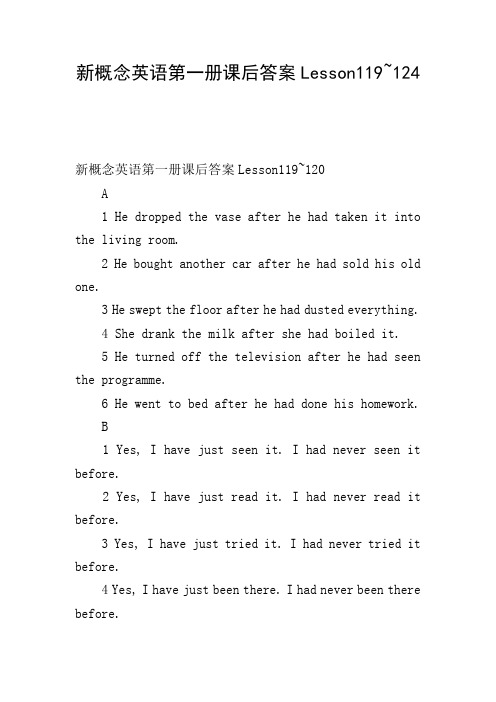
新概念英语第一册课后答案Lesson119~124新概念英语第一册课后答案Lesson119~120A1 He dropped the vase after he had taken it into the living room.2 He bought another car after he had sold his old one.3 He swept the floor after he had dusted everything.4 She drank the milk after she had boiled it.5 He turned off the television after he had seen the programme.6 He went to bed after he had done his homework.B1 Yes, I have just seen it. I had never seen it before.2 Yes, I have just read it. I had never read it before.3 Yes, I have just tried it. I had never tried it before.4 Yes, I have just been there. I had never been there before.5 Yes, I have just written a letter in English. I had never written a letter in English before.6 Yes, I have just watched this programme. I had never watched this programme before.C1 It was too late. He had already painted it.2 It was too late. She had already dusted it.3 It was too late. You had already telephoned him.4 It was too late. You had already corrected it.5 It was too late. They had already shut it.6 It was too late. She had already made it.D1 I went to the doctor after I had made an appointment.2 The boss left the office after he had finished work.3 My wife went out after she had finished the housework.4 My teacher gave me my exercise book after he had corrected it.5 My sister went on holiday after she had taken the examination.6 I bought a new car after I had sold my old one. 新概念英语第一册课后答案Lesson121~122A1 This is the car which the mechanic repaired yesterday.2 He is the man whom I invited to the party.3 These are the things which I bought yesterday.4 He is the man who came here last week.5 He is the policeman who caught the thieves.6 She is the nurse who looked after me.7 She is the woman whom I met at the party.8 I am the person who wrote to you.B1 Who met him? That woman? Yes, she’s the woman who met him.2 Who sat there? That man? Yes, he’s the man who sat there.3 Who made it? That woman? Yes, she’s the woman who made it.4 Who read it? That man? Yes, he’s the man who read it.5 Who shut it? That man? Yes, he’s the man who shut it.6 Who took it? That woman? Yes, she’s the woman who took it.7 Who told me? That man? Yes, he’s the man who toldme.8 Who saw me? That woman? Yes, she’s the woman who saw me.C1 Whom did you see? That man? Yes, he’s the man whom I saw.2 Whom did you telephone? That woman? Yes, she’s the woman whom I telephoned.3 Whom did you invited? That man? Yes, he’s the man whom I invited.4 Whom did you to the to the cinema? That man? Yes, he’s the man whom I took to the cinema.5 Whom did you find in the garden? That man? Yes, he’s the man whom I found in the garden.6 Whom did you drive to London? That woman? Yes, she’s the woman whom I drove to London.7 Whom did you hear? That woman? Yes, she’s the woman whom I heard.8 Whom did you remember? That man? Yes, he’s the man whom I remembered.新概念英语第一册课后答案Lesson123~124A1 She is the woman I drove to London.2 That’s the film I saw.3 That’s the man I spoke to.4 They are the thieves the police caught.5 These are the letters I typed.6 These are the people you asked me about.B1 Which man? That man? Yes, that’s the man I saw yesterday.2 Which car? That car? Yes, that’s the car I repaired yesterday.3 Which woman? That woman? Yes, that’s the womanI drove to London yesterday.4 Which umbrella? That umbrella? Yes, that’s the umbrella I bought yesterday.5 Which medicine? That medicine? Yes, that’s the medicine I took yesterday.6 Which man? That man? Yes, that’s the man I invited to my house yesterday.C1 That’s right. This is the village I wrote to you about.2 That’s right. He is the person I have heard about.3 That’s right. This is the test I spoke to you about.4 That’s right. She is the woman I read about.5 That’s right. This is something(new) I haven’t thought about.6 That’s right. This is something I must decide about.。
新概念第一册第119-120课语法重点
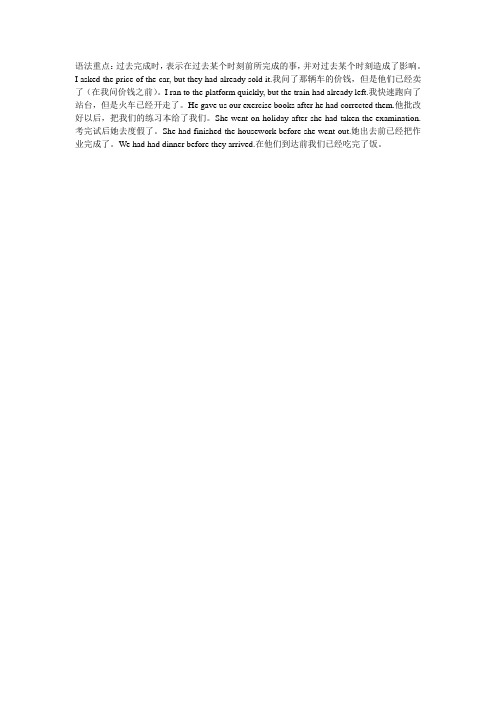
语法重点:过去完成时,表示在过去某个时刻前所完成的事,并对过去某个时刻造成了影响。
I asked the price of the car, but they had already sold it.我问了那辆车的价钱,但是他们已经卖了(在我问价钱之前)。
I ran to the platform quickly, but the train had already left.我快速跑向了站台,但是火车已经开走了。
He gave us our exercise books after he had corrected them.他批改好以后,把我们的练习本给了我们。
She went on holiday after she had taken the examination.考完试后她去度假了。
She had finished the housework before she went out.她出去前已经把作业完成了。
We had had dinner before they arrived.在他们到达前我们已经吃完了饭。
新概念一册l119-121课重难点和练习

新概念一册l119-121课重难点和练习Lesson119– Lesson 121 姓名:家长签字:●重点句型:1. I want to tell you a true story .Tell sb a story 给某人讲故事2. It happened to a friend of mine a year ago.(1)happen 发生Eg: What happened ? 怎么了?Sth happen to sb. , (某事) 发生在某人的身上.Eg:Good things always happen to me .总有好事发生在我的身上Sb happen to do sth 某人碰巧做某事(2)a friend of mine,我的朋友之一。
3.After they had entered the house, they went into the dining room.entered 是enter 的过去分词,“进入”had entered 是过去完成时,表示在某个过去时间之前发生的动作4. It was very dark, so they turned on a torch.turn on, 打开,拧开(电视、水源、煤气等)。
其反义词为turn off(关上)。
5. Suddenly, they heard a voice behind them. "What's up? What's up?" someone called. Thethieves dropped the torch and ran away as quickly as they could.1)suddenly 忽然、突然地2)voice 嗓音,有声带震动发出的声音;noise 尤指噪音;sound 用来指一切声响3)what’s up ?干什么?有什么事?4)run away 跑开,逃跑6. I bought two expensive dictionaries here half an hour ago, but I forgot to take them with me.1)half an hour ago 半小时以前(用于一般过去式)2)forget to do 表示忘记去做某事forget doing 忘记做过….3) take sth with sb 把某物带走bring sth with sb 把某物带来take sth to sb =take sb sth 把某物拿去给某人●重点语法:一. 过去完成时构成: had +过去分词。
新概念英语第一册课后答案Lesson119~124(最新)
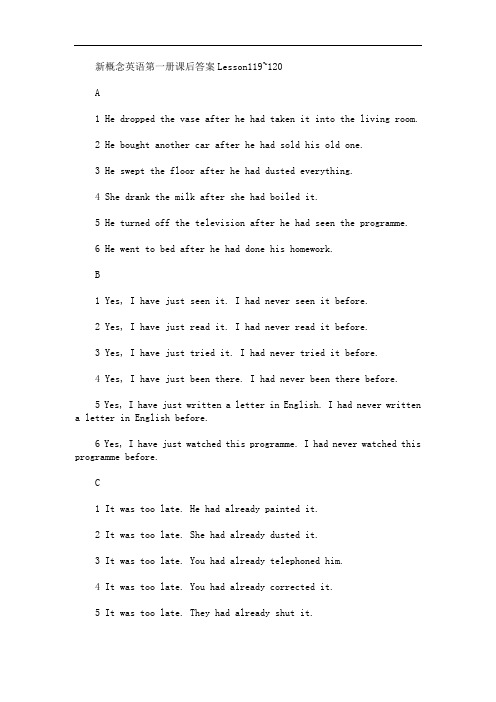
新概念英语第一册课后答案Lesson119~120A1 He dropped the vase after he had taken it into the living room.2 He bought another car after he had sold his old one.3 He swept the floor after he had dusted everything.4 She drank the milk after she had boiled it.5 He turned off the television after he had seen the programme.6 He went to bed after he had done his homework.B1 Yes, I have just seen it. I had never seen it before.2 Yes, I have just read it. I had never read it before.3 Yes, I have just tried it. I had never tried it before.4 Yes, I have just been there. I had never been there before.5 Yes, I have just written a letter in English. I had never writtena letter in English before.6 Yes, I have just watched this programme. I had never watched this programme before.C1 It was too late. He had already painted it.2 It was too late. She had already dusted it.3 It was too late. You had already telephoned him.4 It was too late. You had already corrected it.5 It was too late. They had already shut it.6 It was too late. She had already made it.D1 I went to the doctor after I had made an appointment.2 The boss left the office after he had finished work.3 My wife went out after she had finished the housework.4 My teacher gave me my exercise book after he had corrected it.5 My sister went on holiday after she had taken the examination.6 I bought a new car after I had sold my old one.新概念英语第一册课后答案Lesson121~122A1 This is the car which the mechanic repaired yesterday.2 He is the man whom I invited to the party.3 These are the things which I bought yesterday.4 He is the man who came here last week.5 He is the policeman who caught the thieves.6 She is the nurse who looked after me.7 She is the woman whom I met at the party.8 I am the person who wrote to you.B1 Who met him? That woman? Yes, she's the woman who met him.2 Who sat there? That man? Yes, he's the man who sat there.3 Who made it? That woman? Yes, she's the woman who made it.4 Who read it? That man? Yes, he's the man who read it.5 Who shut it? That man? Yes, he's the man who shut it.6 Who took it? That woman? Yes, she's the woman who took it.7 Who told me? That man? Yes, he's the man who told me.8 Who saw me? That woman? Yes, she's the woman who saw me.C1 Whom did you see? That man? Yes, he's the man whom I saw.2 Whom did you telephone? That woman? Yes, she's the woman whom I telephoned.3 Whom did you invited? That man? Yes, he's the man whom I invited.4 Whom did you to the to the cinema? That man? Yes, he's the man whomI took to the cinema.5 Whom did you find in the garden? That man? Yes, he's the man whomI found in the garden.6 Whom did you drive to London? That woman? Yes, she's the woman whomI drove to London.7 Whom did you hear? That woman? Yes, she's the woman whom I heard.8 Whom did you remember? That man? Yes, he's the man whom I remembered.新概念英语第一册课后答案Lesson123~124A1 She is the woman I drove to London.2 That's the film I saw.3 That's the man I spoke to.4 They are the thieves the police caught.5 These are the letters I typed.6 These are the people you asked me about.B1 Which man? That man? Yes, that's the man I saw yesterday.2 Which car? That car? Yes, that's the car I repaired yesterday.3 Which woman? That woman? Yes, that's the woman I drove to London yesterday.4 Which umbrella? That umbrella? Yes, that's the umbrella I bought yesterday.5 Which medicine? That medicine? Yes, that's the medicine I took yesterday.6 Which man? That man? Yes, that's the man I invited to my house yesterday.C1 That's right. This is the village I wrote to you about.2 That's right. He is the person I have heard about.3 That's right. This is the test I spoke to you about.4 That's right. She is the woman I read about.5 That's right. This is something(new) I haven't thought about.6 That's right. This is something I must decide about.。
新概念第一册119-120教案.doc
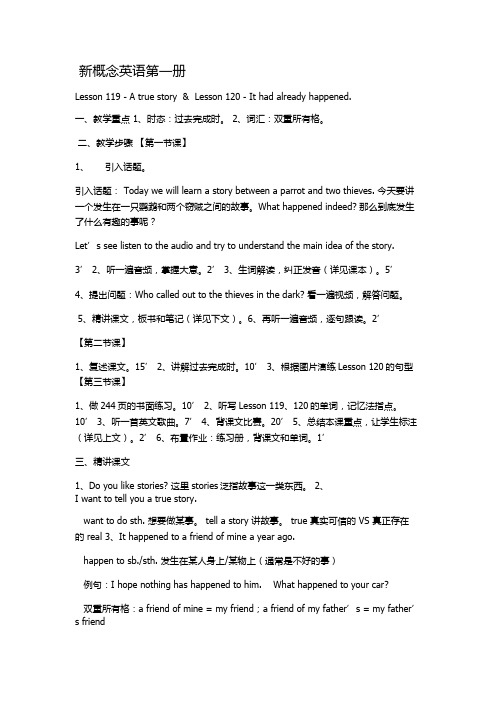
新概念英语第一册Lesson 119 - A true story & Lesson 120 - It had already happened.一、教学重点 1、时态:过去完成时。
2、词汇:双重所有格。
二、教学步骤【第一节课】1、引入话题。
引入话题: Today we will learn a story between a parrot and two thieves. 今天要讲一个发生在一只鹦鹉和两个窃贼之间的故事。
What happened indeed? 那么到底发生了什么有趣的事呢?Let’s see listen to the audio and try to understand the main idea of the story.3’ 2、听一遍音频,掌握大意。
2’ 3、生词解读,纠正发音(详见课本)。
5’4、提出问题:Who called out to the thieves in the dark? 看一遍视频,解答问题。
5、精讲课文,板书和笔记(详见下文)。
6、再听一遍音频,逐句跟读。
2’【第二节课】1、复述课文。
15’2、讲解过去完成时。
10’3、根据图片演练Lesson 120的句型【第三节课】1、做244页的书面练习。
10’2、听写Lesson 119、120的单词,记忆法指点。
10’3、听一首英文歌曲。
7’4、背课文比赛。
20’5、总结本课重点,让学生标注(详见上文)。
2’6、布置作业:练习册,背课文和单词。
1’三、精讲课文1、Do you like stories? 这里stories泛指故事这一类东西。
2、I want to tell you a true story.want to do sth. 想要做某事。
tell a story 讲故事。
true 真实可信的 VS 真正存在的 real 3、It happened to a friend of mine a year ago.happen to sb./sth. 发生在某人身上/某物上(通常是不好的事)例句:I hope nothing has happened to him. What happened to your car?双重所有格:a friend of mine = my friend;a friend of my father’s = my father’s friend4While my friend, George, was reading in bed, two thieves climbed into his kitchen. 【回顾Lesson 117】while引导的时间状语从句(持续性动词的过去进行时)。
新概念英语一册119-120课习题

新概念英语一册119-120课习题Lesson 119A true story一个真实的故事一、填空1.黑暗的2.明亮的3.一个真实的故事4.它已经发生了5.柜台6.认出7.手电筒8.经理9.绅士10.尽可能快的二、从下面A、B、C三个选项中选出正确的答案,并把正确的字母编号写在括号里。
()1. The thieves had already gone before the policeman ________.A. had arrivedB. would arriveC. arrived()2. ---- I am going to Japan next month.---- ______ you are there, can you buy me a Japanese digital camera?A. becauseXXX.A. XXXA. have left---- Because I ______.A. wasn’t invitedA. openedA. am lookingA. SinceA. use to liveA. Yes, I haveB. XX X’t inviteB. XXXB. was cookingB. FromB. used to livingC. had been invitedC. XXX off onC. cookedC, ByC. used to live()6. Shortly after I had entered the room, I ____the light.()7. While I _____ with my girlfriend in the kitchen, XXX.()8. _______ then I has been XXX.()9. I ______ in this small XXX I was a child.()10 ----- Have you ever seen dinosaur eggs?---________.B. No, I XXX, I do()11. Though the famous dancer, Tai Lihua, is deaf, she dances _____most of the people.A. as good asB. as well asC. better thanA. XXXA. have been XXX decideA. been XXX XXX()12. Don’t give up your hope no matter what ______.()13. They ____ where to build the new hospital before the work began.()14. Great changes have _____ _____ XXX.B. arrivedB. has leftC. climbedC. has been away()4. The old woman ______ for nearly two and half hours.()5. ----Why didn’t you go to the party last night?B. XXX()3. We all XXX we _____ the top of the mountain because we could see the whole city()15. People ___ XXX.A. entersB. enter inC. enter for三、阅读理解:Dear XXX,Hi! I am Kevin from India, I really feel lucky to write you a letter.XXX I live far away from your world, I think we are a little alike. You are a great wizard(奇才).You have done XXX Idon’t do magic, I do believe in it. Well, I also a wizardat school. And I can often get A’s, but I am not abookworm. I like to play jokes in class, XXX I also have many friends. They often get me into and out of trouble.No matter what has happened, we still get close together.Oh, XXXXXX students. We have modern classes and XXX. But when much is given, much isexpected, so I often stay up XXX,I can read your stories in my free time. I feel like I know you. You are young, but you know how to XXX you think with a clear head even in danger .What a great boy youare. How I wish XXX.May you have a nice time.()1. Kevin and Harry are a little alike because_______.A.they almost have the same XXXB.their worlds are full of magiC.their school are close to each other()2. In the passage we know that Kevin______.A.is a slow boy in classB.is fed up with much XXX to keep quite in class()3. Which of the followings is NOT the reason that Kevin likes Harry?______。
新概念课堂笔记第一册Lesson119-120
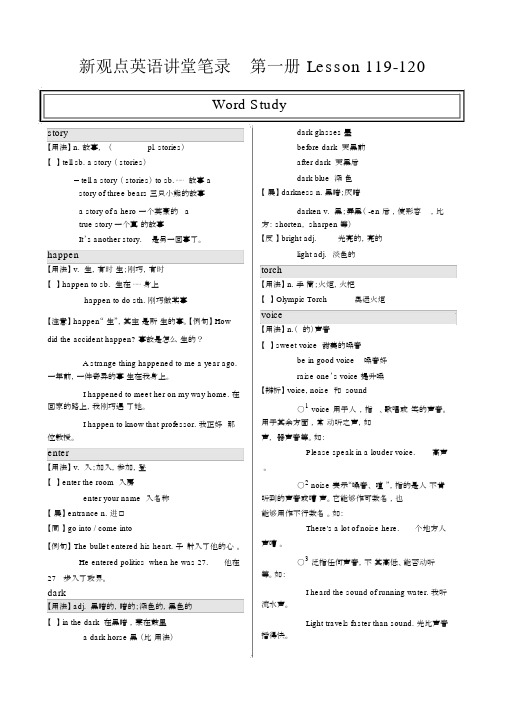
新观点英语讲堂笔录第一册Lesson 119-120Word Studystory【用法】 n. 故事,(pl. stories)【】 tell sb. a story ( stories)= tell a story ( stories) to sb.⋯⋯故事astory of three bears 三只小熊的故事a story of a hero 一个英豪的 atrue story 一个真的故事It’s another story.是另一回事了。
happen【用法】 v. 生,有时生;刚巧,有时【】 happen to sb. 生在⋯⋯身上happen to do sth. 刚巧做某事【注意】 happen“ 生”,其主是所生的事。
【例句】 Howdid the accident happen? 事故是怎么生的?A strange thing happened to me a year ago. 一年前,一件奇异的事生在我身上。
I happened to meet her on my way home. 在回家的路上,我刚巧遇了她。
I happen to know that professor. 我正好那位教授。
enter【用法】 v. 入;加入,参加,登【】 enter the room 入房enter your name 入名称【展】 entrance n. 进口【同】 go into / come into【例句】 The bullet entered his heart. 子射入了他的心。
He entered politics when he was 27.他在27步入了政界。
dark【用法】 adj. 黑暗的,暗的;深色的,黑色的【】 in the dark 在黑暗,蒙在鼓里a dark horse 黑(比用法)dark glasses 墨before dark 天黑前after dark 天黑后dark blue 深色【展】 darkness n. 黑暗;灰暗darken v. 黑;弄黑( -en 后,使形容,比方: shorten, sharpen 等)【反】 bright adj.光亮的,亮的light adj.淡色的torch【用法】 n. 手筒;火炬,火把【】 Olympic Torch奥运火炬voice【用法】 n.(的)声音【】 sweet voice 甜美的嗓音be in good voice嗓音好raise one’s voice 提升嗓【辨析】 voice, noise 和 sound○1 voice 用于人,指、歌唱或笑的声音。
(完整版)新概念英语第一册Lesson119-120练习题(无答案)
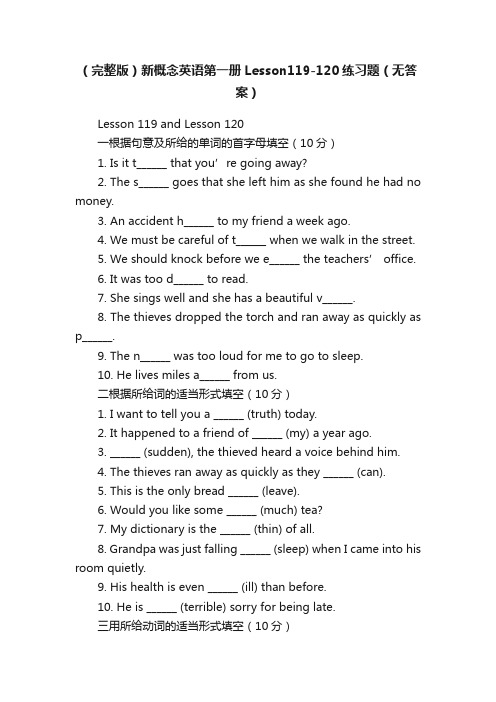
(完整版)新概念英语第一册Lesson119-120练习题(无答案)Lesson 119 and Lesson 120一根据句意及所给的单词的首字母填空(10分)1. Is it t______ that you’re going away?2. The s______ goes that she left him as she found he had no money.3. An accident h______ to my friend a week ago.4. We must be careful of t______ when we walk in the street.5. We should knock before we e______ the teachers’ office.6. It was too d______ to read.7. She sings well and she has a beautiful v______.8. The thieves dropped the torch and ran away as quickly as p______.9. The n______ was too loud for me to go to sleep.10. He lives miles a______ from us.二根据所给词的适当形式填空(10分)1. I want to tell you a ______ (truth) today.2. It happened to a friend of ______ (my) a year ago.3. ______ (sudden), the thieved heard a voice behind him.4. The thieves ran away as quickly as they ______ (can).5. This is the only bread ______ (leave).6. Would you like some ______ (much) tea?7. My dictionary is the ______ (thin) of all.8. Grandpa was just falling ______ (sleep) when I came into his room quietly.9. His health is even ______ (ill) than before.10. He is ______ (terrible) sorry for being late.三用所给动词的适当形式填空(10分)1. What ______ your brother ______ (do) at that time?2. She went on holiday after she ______ (take) the examination.3. When I ran to the platform quickly, the train ______ (leave).4. While my friend, George ______ (read) in bed, two thieves climbed into his kitchen.5. The thieves ______ (go) before George turned on the light.6. They ______ (learn) over 2000 English words by the end of last term.7. He ______ (stay) in New York from June to November last year.8. The child was crossing the street when he suddenly ______ (fall) to the ground.9. I have a lot of work ______ (do).10. They don’t know how ______ (spell) this word.四选择填空(15分)( ) 1. Let’s go out for a drink when we ______ this work.A. will finishB. will have finishedC. finishedD. have finished( ) 2. A: Did you see Betty yesterday?B: Yes, she ______ a letter when I went to her house.A. has writtenB. had writtenC. was writingD. had been writing( ) 3. The student ______ to move the bag of rice ______ he heard the sound of a motorbike.A. was running, whenB. was running, whileC. ran, whenD. ran, while( ) 4. An accident happened ______ my friend the other day.A. onB. inC. forD. to( ) 5. After they ______ the house, they went into the dining room.A. were enteringB. enteredC. have enteredD. had entered ( ) 6. He asked me ______ during the winter holidays.A. where I had goneB. where I had beenC. where had I goneD. where had I been( ) 7. Helen ______ her keys in the office so she had to wait until her husband ______ home.A. has left, comesB. left, had comeC. had left, cameD. had left, was coming( ) 8. Your grandpa had walked for two weeks before he reached the city, ______?A. was itB. did heC. had youD. hadn’t he ( ) 9. He never tells ______.A. true anythingB. real anythingC. anything trueD. something real ( ) 10. ______? They have had a crash.A. What was happeningB. What is happeningC. What happenedD. What has happened( ) 11. How far is it?It’s about two kilometers ______.A. alongB. awayC. farD. off( ) 12. Suddenly he heard a ______ behind them, “What’s up?”A. soundB. noiseC. voiceD. knock( ) 13. It was late but he still went on ______.A. studyB. to studyC. studyingD. studied ( ) 14. Don’t let ______ in. I’m too busy to met ______.A. nobody, somebodyB. anybody, nobodyC. anybody, anybodyD. somebody, anybody( ) 15. A friend of ______ is a doctor.A. meB. myC. ID. mine五句型转换(10分)1. I asked the price of the car, but they had already sold it.(变为同义句)______ I asked the price of the car, they ______ already sold it.2. It is two kilometers away from here to there.(就换线部分提问)______ ______ is it from here to there?3. The thieves ran away as quickly as they could.(变为同义句)The thieves ran away as ______ as ______.4. The story sounded too good. It couldn’t be true.(两句合并成一句)The story sounded ______ good ______ be true.5. Both of my parents gave me presents.(改为否定句)______ of my parents ______ me presents.6. They met her in the street by chance.(变为同义句)They ______ to ______ her in the street.7. The shirt was too expensive for him to buy.(变为同义句)The shirt cost ______ ______ for him to buy.8. He left here two weeks ago.(变为同义句)He ______ been ______ for two weeks.9. He had an accident yesterday.(变为同义句)An accident ______ ______ him yesterday.10. She went on holiday after she had taken the exam.(变为同义句)She ______ taken the exam ______ she went on holiday.六根据汉语提示完成句子(10分)1. 我要给你讲一个真实的故事。
新概念英语第一册 Lesson119-120语法点归纳学案(含练习答案)
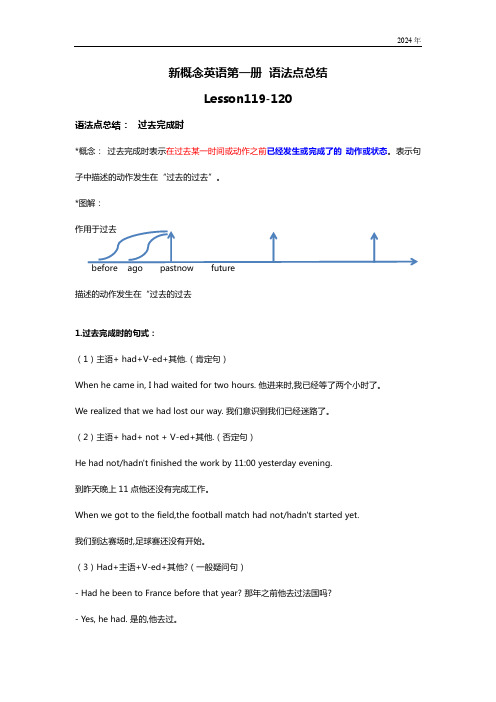
新概念英语第一册语法点总结Lesson119-120语法点总结:过去完成时*概念:过去完成时表示在过去某一时间或动作之前已经发生或完成了的动作或状态。
表示句子中描述的动作发生在“过去的过去”。
*图解:描述的动作发生在“过去的过去1.过去完成时的句式:(1)主语+ had+V-ed+其他.(肯定句)When he came in, I had waited for two hours. 他进来时,我已经等了两个小时了。
We realized that we had lost our way. 我们意识到我们已经迷路了。
(2)主语+ had+ not + V-ed+其他.(否定句)He had not/hadn't finished the work by 11:00 yesterday evening.到昨天晚上11点他还没有完成工作。
When we got to the field,the football match had not/hadn't started yet.我们到达赛场时,足球赛还没有开始。
(3)Had+主语+V-ed+其他?(一般疑问句)- Had he been to France before that year? 那年之前他去过法国吗?- Yes, he had. 是的,他去过。
- No, he hadn't. 不,他没去过。
(4)疑问词+ had+主语+ V-ed+其他?(特殊疑问句)- What had Lily done before she went to bed last night? 昨晚莉莉去睡觉之前做了什么? - She had cleaned the room. 她打扫了房间。
2.过去完成时的用法:(1)表示在过去某一时间或动作之前已经完成或结束的动作。
常与过去完成时连用的时间状语有以下几种(2)①用 by, before 等构成的介词短语Linda had learned 10 Chinese songs by the end of last month.到上个月底,琳达已经学了10首中文歌。
新概念英语一册知识点与练习Lesson119~120
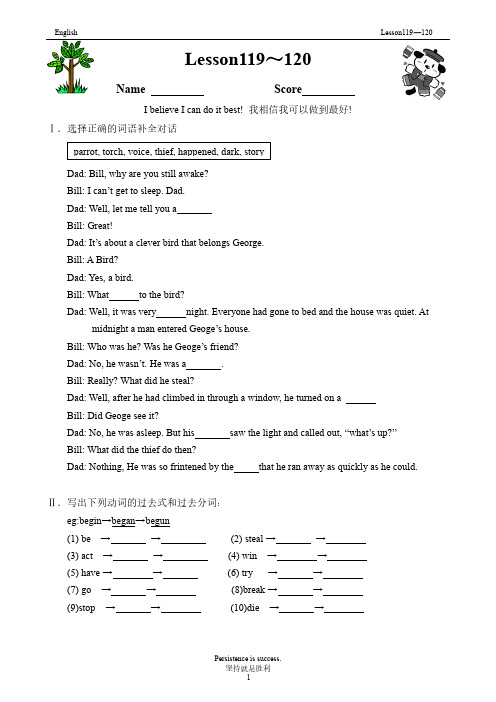
I believe I can do it best! 我相信我可以做到最好!Ⅰ.选择正确的词语补全对话Dad: Bill, why are you still awake?Bill: I can ’t get to sleep. Dad.Dad: Well, let me tell you aBill: Great!Dad: It ’s about a clever bird that belongs George.Bill: A Bird?Dad: Yes, a bird.Bill: What to the bird?Dad: Well, it was very night. Everyone had gone to bed and the house was quiet. At midnight a man entered Geoge ’s house.Bill: Who was he? Was he Geoge ’s friend?Dad: No, he wasn ’t. He was a .Bill: Really? What did he steal?Dad: Well, after he had climbed in through a window, he turned on aBill: Did Geoge see it?Dad: No, he was asleep. But his saw the light and called out, “what ’s up?”Bill: What did the thief do then?Dad: Nothing, He was so frintened by the that he ran away as quickly as he could.Ⅱ.写出下列动词的过去式和过去分词:eg:begin→began →b egun(1) be → → (2) steal → →(3) act → → (4) win → →(5) have → → (6) try → →(7) go → → (8)break → →(9)stop → → (10)die → →Ⅲ.用动词适当形式填空:(1).I didn’t know Jane (buy) a new car. I thought She (not save)enough money to buy it.(2).I was told that I (win) the award.(3).The girl said she (close)the front windows but she (not close)thebalk windows when she (leave) the house.(4).By ten o’clock in the morning the mayor of the city (answer) all the questionthat the people asked.英美文化浓厚的几处景致1. Wall Street (华尔街)纽约曼哈顿岛南部的一条街。
新概念英语第1册第119-120课重点语法
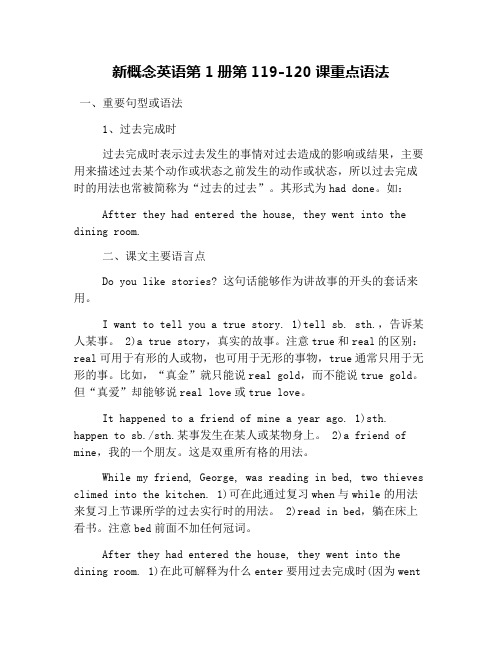
新概念英语第1册第119-120课重点语法一、重要句型或语法1、过去完成时过去完成时表示过去发生的事情对过去造成的影响或结果,主要用来描述过去某个动作或状态之前发生的动作或状态,所以过去完成时的用法也常被简称为“过去的过去”。
其形式为had done。
如:Aftter they had entered the house, they went into the dining room.二、课文主要语言点Do you like stories? 这句话能够作为讲故事的开头的套话来用。
I want to tell you a true story. 1)tell sb. sth.,告诉某人某事。
2)a true story,真实的故事。
注意true和real的区别:real可用于有形的人或物,也可用于无形的事物,true通常只用于无形的事。
比如,“真金”就只能说real gold,而不能说true gold。
但“真爱”却能够说real love或true love。
It happened to a friend of mine a year ago. 1)sth. happen to sb./sth.某事发生在某人或某物身上。
2)a friend of mine,我的一个朋友。
这是双重所有格的用法。
While my friend, George, was reading in bed, two thieves climed into the kitchen. 1)可在此通过复习when与while的用法来复习上节课所学的过去实行时的用法。
2)read in bed,躺在床上看书。
注意bed前面不加任何冠词。
After they had entered the house, they went into the dining room. 1)在此可解释为什么enter要用过去完成时(因为wentinto the dining room是发生在过去的,而enter是在此之前发生的,所以要用had entered)。
新概念课堂笔记 第一册 Lesson 119-120-word文档资料

新概念英语课堂笔记第一册Lesson 119-120story【用法】n. 故事,传说(pl. stories)【词组】tell sb. a story(stories)= tell a story(stories)to sb.给……讲故事a story of three bears 三只小熊的故事a story of a hero 一个英雄的传说a true story 一个真实的故事It’s another story. 这是另一回事了。
happen【用法】v. 发生,偶然发生;碰巧,偶然发现【词组】happen to sb. 发生在……身上happen to do sth. 碰巧做某事【注意】happen“发生”,其主语是所发生的事。
【例句】How did the accident happen? 事故是怎么发生的?A strange thing happened to me a year ago. 一年前,一件奇怪的事发生在我身上。
I happened to meet her on my way home. 在回家的路上,我碰巧遇见了她。
I happen to know that professor. 我正好认识那位教授。
enter【用法】v. 进入;加入,参加,登录【词组】enter the room 进入房间enter your name 输入名称【扩展】entrance n. 入口【同义】go into / come into【例句】The bullet entered his heart. 子弹射入了他的心脏。
He entered politics when he was 27. 他在27岁时步入了政界。
dark【用法】adj. 黑暗的,暗的;深色的,黑色的【词组】in the dark 在黑暗处,蒙在鼓里a dark horse 黑马(比喻用法)dark glasses 墨镜before dark 天黑前after dark 天黑后dark blue 深蓝色【扩展】darkness n. 黑暗;阴暗darken v. 变黑;弄黑(-en后缀,使形容词变动词,比如:shorten,sharpen等)【反义】bright adj. 明亮的,亮的light adj. 浅色的torch【用法】n. 手电筒;火炬,火把【词组】Olympic Torch 奥运火炬voice【用法】n.(说话的)声音【词组】sweet voice 甜美的嗓音be in good voice 嗓音好raise one’s voice 提高嗓门【辨析】voice, noise 和sound○1voice用于人时,指说话、歌唱或发笑的声音。
新概念英语第一册Lesson119120Atruestory小学英语初中英语全国通用

Warm-up
课前热身
过去完成时
Warm-up
课前热身
as ... as ... :和... 一样···
e.g. as soon as possible : 尽快(ASAP)
查看答案解析
答案:He went to bed after he had done his homework.; 解析: 考查过去完成时的用法。 过去完成时用来表示两个过去的动作中,发生在前的那个动作,简言之就是动作发生在过去的 过去, 其基本构成如下:主语+ had +动词的过去分词+其他。在本题中 , 存在两个过去的 动作 “went to bed” 和 “did his homework” ,很显然 , 根据正常的逻辑思维可判断出 “did h也 homework” 发生在前 , 应使用过去完成时,即had done, “went to bed” 发生在后. 应使用一 般过去时 , 两者用after合并起来得出答案为He went to bed after he had done his homework.; 译文:他做完家庭作业之后睡觉去了。
上一题
下一题
根据汉语提示填空。 Mummy, could your ead a _______ for me before sleep? (故事)(请用本课所学单词填空)
正确答案: story
查看答案解析
答案:story ; 解析: story n. 故事; 译文:妈妈,睡觉前你能给我读个故事吗?
上一题
Language Point
- 1、下载文档前请自行甄别文档内容的完整性,平台不提供额外的编辑、内容补充、找答案等附加服务。
- 2、"仅部分预览"的文档,不可在线预览部分如存在完整性等问题,可反馈申请退款(可完整预览的文档不适用该条件!)。
- 3、如文档侵犯您的权益,请联系客服反馈,我们会尽快为您处理(人工客服工作时间:9:00-18:30)。
Lesson119– Lesson 121 姓名:家长签字:
●重点句型:
1. I want to tell you a true story .
Tell sb a story 给某人讲故事
2. It happened to a friend of mine a year ago.
(1)happen 发生Eg: What happened ? 怎么了?
Sth happen to sb. , (某事) 发生在某人的身上.
Eg:Good things always happen to me .总有好事发生在我的身上
Sb happen to do sth 某人碰巧做某事
(2)a friend of mine,我的朋友之一。
3.After they had entered the house, they went into the dining room.
entered 是enter 的过去分词,“进入”
had entered 是过去完成时,表示在某个过去时间之前发生的动作
4. It was very dark, so they turned on a torch.
turn on, 打开,拧开(电视、水源、煤气等)。
其反义词为turn off(关上)。
5. Suddenly, they heard a voice behind them. "What's up? What's up?" someone called. The
thieves dropped the torch and ran away as quickly as they could.
1)suddenly 忽然、突然地
2)voice 嗓音,有声带震动发出的声音;noise 尤指噪音;sound 用来指一切声响
3)what’s up ?干什么?有什么事?
4)run away 跑开,逃跑
6. I bought two expensive dictionaries here half an hour ago, but I forgot to take them with me.
1)half an hour ago 半小时以前(用于一般过去式)
2)forget to do 表示忘记去做某事
forget doing 忘记做过….
3) take sth with sb 把某物带走
bring sth with sb 把某物带来
take sth to sb =take sb sth 把某物拿去给某人
●重点语法:
一. 过去完成时
构成: had +过去分词。
过去完成时主要用于表示两个事件中一个发生在前,或者说是表示较早的过去。
常与现在完成时连用的副词,如 already(已经), ever(曾经),for +表示时间段的词,just(刚刚)和never(从未)也常与过去完成时连用,以强调事件发生的先后次序。
有时我们不一定非得用过
去完成时表示先发生的事件,因为意思十分清楚,如:
After I finished ,I went home.我做完后就回家了。
She went on holiday after she had taken the exam.她考试后度假去了。
We had had dinner before they arrived.他们到达之前我们就已吃饭了。
The patient had died when the doctor arrived. 大夫到达时病人已经死了。
二、定语从句
定语从句像形容词一样起修饰作用,但位于所修饰的名词之后。
定语从句由关系代词引导,紧跟在它所修饰的成分后面。
关系代词who,whom与that修饰人,which与that修饰东西。
关系代词指代从句的主语或宾语,同时又充当连接词,把从句和主句连接起来。
请看例句:
(1)关系代词作从句的主语(who/which/that):
The man who was here yesterday is a teacher .
This the book which is difficult .
Is he the man that sells eggs ?
(2)关系代词作从句的宾语(whom/that/which):
The man whom I saw is called Mike .
The letter that I heard from him is very difficult .
●
●课后练习:
一.中英互译
1.
2. 逃走_________________ 2.半小时____________________
3.打开_________________
4. put on ________________
5.take sth with sb _________________
6.Sth happen to sb________________
二.按要求改下下列句子
1.He opened the window .He closed the door first .(用before连接两个句子)
2.She played computer game .she finished her homework first .( 用before连接两个句子)
3.They locked the door .They went to the park .(用after连接两个句子)
4.The children had their breakfast .they went to school.(用after连接两个句子)
5.I received a letter .It was from my friend .(改成定语从句)
6.He is the thief .The police caught yesterday . (改成定语从句)
7.This is our school .You visited last week . (改成定语从句)。
